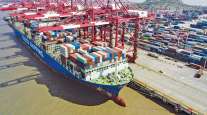OEMs Confident of Meeting Growing U.S. Truck Demand
This story appears in the Dec. 13 print edition of Transport Topics.
Truck manufacturers said they are prepared to boost production to meet increasing demand in 2011, although some experts warned shortages of key components could develop as suppliers struggle to keep up with what could be one of the strongest sales markets in years.
Already, tire supplies are tight and some shortages of diesel particulate filters have been reported, according to Doug Clark, president of Ameriquest Transportation Services, a truck leasing and procurement firm in Cherry Hill, N.J.
“If we have an increase in orders ranging from 40% to 65% as predicted by some industry experts, other shortages could arise or production times could be extended,” Clark said.
Nearly all truck manufacturers said they expect the market to gradually strengthen, which will make it easier to keep up with demand.
“We are well-positioned and fully prepared for continued growth in Class 8 demand from a manufacturing standpoint,” said Amy Sills, director of corporate communications at Daimler Trucks North America, Portland, Ore., the largest Class 8 truck manufacturer on the continent.
Sills said the company expects retail sales of 165,500 Class 8 trucks in the United States, Canada and Mexico in 2011, and increase of 24% from 133,500 in 2010 but still well short of the record of 284,008 Class 8 trucks sold in the United States alone in 2006.
“Our production planning includes a close and continuous focus on material planning. We are working with our major suppliers on a variety of measures to ensure that 2011 build requirements will be met,” Sills said.
Ron Huibers, senior vice president of sales and marketing for Volvo Trucks North America, and Kevin Flaherty, senior vice president of Mack Trucks, issued similarly worded statements expressing confidence that each company can “effectively manage” production and minimize potential supply chain issues.
“We see the 2011 North American heavy-duty truck market exceeding 200,000 units,” Huibers said. “With the gradual improvement in demand this year, we’ve increased production in our New River Valley plant . . . where all Volvo trucks in North America are assembled.”
Flaherty said Mack has “gradually” ramped up production in its Macungie, Pa., plant “in response to an uptick in customer demand.”
Mark Pigott, chairman of Paccar Inc., parent of Kenworth Truck Co. and Peterbilt Motors, said his company takes a collaborative approach with suppliers, even helping some companies to buy equipment and train their workers.
“We invest in our suppliers where we’ll actually purchase capital equipment, which allows them to increase their capacity, increase their quality, reduce their cost, improve their profitability,” Pigott said in an Oct. 26 conference call.
Pigott said the company helps suppliers by “paying our bills in a very timely basis” and inviting suppliers into Paccar’s engineering group at an early stage “to get their input on new designs.”
The process works “very, very well,” Pigott said.
Roy Wiley, spokesman for Navistar International Corp., said a new pact with the United Auto Workers gives the company greater flexibility to shift production.
“We’re prepared to handle any increase in volume,” Wiley said.
As an example, Wiley said, Navistar used to produce only medium-duty trucks at its Springfield, Ohio, plant. “Now we can produce Class 8 trucks there too,” he said.
Navistar expects production of Classes 6-8 vehicles in North America for the fiscal year ending Oct. 31 to reach 245,000 units, compared with 191,000 in 2010.
Joe Plomin, a vice president with parts maker ArvinMeritor Inc., said his firm is “well-prepared to handle any change in demand.”




